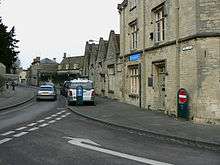Cirencester Castle

Cirencester Castle was a castle in the town of Cirencester in Gloucestershire, England.
The castle was originally built in the 11th century in timber, with a square keep added in stone in 1107.[1] The castle was of primarily local significance, being relatively small.[2] During the Anarchy of the 12th century, the castle was seized in the early years of the conflict by Robert, Earl of Gloucester on behalf of the Empress Matilda.[3] In 1142 King Stephen seized the castle in a surprise attack, setting fire to it afterwards.[4]
Subsequent events are disputed by historians. Most 19th-century historians argued that the castle was subsequently rebuilt and held by William de la Dive, a follower of Robert, Earl of Leicester, then a supporter of the Empress.[4] When Robert came to an agreement with Stephen at the end of the conflict, William surrendered the castle to the king.[4] During the baronial revolt against Henry III the castle was once again garrisoned against the king; once captured by royal forces, Henry ordered it finally destroyed for good.[4] Historian E. Fuller argued in 1890, however, that this later history was a consequence of a misreading of place names, arguing that the history of the castle concluded with its destruction in 1142.[5]
See also
References
Bibliography
- Clarke, Benjamin. (1852) The British Gazetteer: Political, Commercial, Ecclesiastical, and Historical. London: Collins.
- Fuller, E. A. (1890) Cirencester Castle, in Transactions of the Bristol and Gloucestershire Archaeological Society, 1890-1, Vol. 15.
- Pounds, Norman John Greville. (1990) The Medieval Castle in England and Wales: a social and political history. Cambridge: Cambridge University Press. ISBN 978-0-521-45828-3.
Coordinates: 51°42′58″N 1°58′13″W / 51.71611°N 1.97028°W